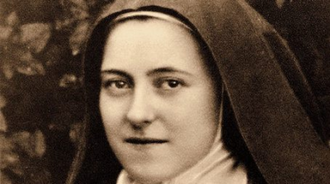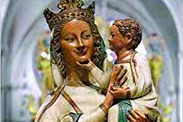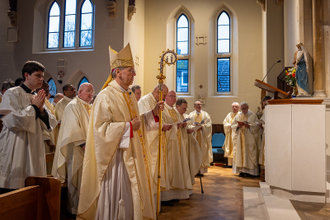St Therese of Lisieux teaches us love and trust in God's mercy

Saint Therese of Lisieux
Source: Vatican News
Pope Francis has published a new Apostolic Exhortation entitled 'C'est la Confiance' (It is the Confidence), dedicated to Saint Therese of Lisieux.
The title was inspired by the words of St Therese written in September 1896: "It is confidence and nothing but confidence that must lead us to love"
Pope Francis says these words: "sum up the genius of her spirituality and would suffice to justify the fact that she has been named a Doctor of the Church".
Francis explains his decision to publish the Exhortation today, the 15th October, and not on a date linked to the life of the Saint, because he wants the message to "transcend those celebrations and be taken up as part of the spiritual treasury of the Church". The date of the publication falls on the memory of St Teresa of Avila to mark St Therese as the "mature fruit" of the spirituality of the great Spanish saint.
In his new teaching document, Pope Francis retraces the steps by which the Popes came to recognise the extraordinary value of Therese's spiritual witness.
Beginning with Pope Leo XIII, who allowed her to enter the convent at the age of 15, he moves on to Pius XI, who proclaimed her a saint in 1925 and in 1927 patron saint of missions. From there, he considers Saint John Paul II, who declared her a Doctor of the Church in 1997. "Finally," recalls Francis, "in 2015, I had the joy of canonizing her parents, Louis and Zelie, during the Synod on the Family. More recently, I devoted one of my weekly General Audience talks to her".
In her cell, the Saint from Lisieux wrote: "Jesus is my one love". Analysing her spiritual experience, the Pope observes that her encounter with Jesus "summoned her to the mission", so much so that she did not conceive "her consecration to God apart from the pursuit of the good of her brothers and sisters."
She had entered Carmel, in fact, "to save souls". Therese expressed her missionary spirit in this way: "I feel that the more the fire of love burns within my heart .... the more also the souls who will approach me (poor little piece of iron, useless if I withdraw from the divine furnace), the more these souls will run swiftly in the odour of the ointments of their Beloved, for a soul that is burning with love cannot remain inactive".
Pope Francis then goes to the heart of Therese's spirituality, that 'little way' also known as the way of spiritual childhood.
The saint wrote: "the elevator which must raise me to heaven is your arms, O Jesus! And for this, I had no need to grow up, but rather I had to remain little and become this more and more".
What counts for her is God's action, grace, not personal merit, because it is the Lord who sanctifies. The Pope writes: "It is most fitting, then, that we should place heartfelt trust not in ourselves but in the infinite mercy of a God who loves us unconditionally and has already given us everything in the Cross of Jesus Christ. For this reason, Therese never uses the expression - common enough in her day - "I will become a saint."
In our lives, where we are often "assailed by fears, the desire for human security, the need to have everything under control " - the trust and therefore the abandonment in God that Therese promotes "sets us free from obsessive calculations, constant worry about the future and fears that take away our peace."
"If we are in the hands of a Father who loves us without limits," she continues, " this will be the case come what may; we will be able to move beyond whatever may happen to us and, in one way or another, his plan of love and fullness will come to fulfilment in our lives".
The spiritual life of the young Carmelite was not without trials and struggles. In the last period of her life, in particular, she experienced the great "trial against the faith". At that time atheism was greatly on the rise, and she "felt herself a sister to atheists", often praying for them.
She believed in God's infinite mercy and in Jesus' ultimate victory over evil: her trust obtained the grace of conversion on the gallows of a multiple murderer.
Everything in God is love, even Justice. "This is one of the loftiest insights of Therese," says the Pope, "one of her major contributions to the entire People of God. In an extraordinary way, she probed the depths of divine mercy, and drew from them the light of her limitless hope."
St Therese wants to "gladden" the Lord, she wants to match Jesus' love. "She possessed complete certainty that Jesus loved her and knew her personally at the time of his Passion," writes Pope Francis, "he contemplated the love of Jesus for all humanity and for each individual, as if he or she were the only one in the world ".
Pope Francis goes on to say: "Therese practised charity in littleness, in the simplest things of daily life, and she did so in the company of the Virgin Mary, from whom she learned that "to love is to give everything. It's to give oneself".
From St Teresa of Avila, we read in the Exhortation, Therese inherited "a great love for the Church and was able to plumb the depths of this mystery ".
She writes in Story of a Soul: "I understood that the Church had a Heart, and that this Heart was burning with love. I understood it was love alone that made the Church's members act ". And then: "Yes, I have found my place in the Church: in the Heart of the Church, my Mother, I will be Love!"
Pope Francis comments: "This heart was not that of a triumphalistic Church, but of a loving, humble and merciful Church ".
He adds: "This discovery of the heart of the Church is also a great source of light for us today. It preserves us from being scandalized by the limitations and weaknesses of the ecclesiastical institution with its shadows and sins, and enables us to enter into the Church's "heart burning with love", which burst into flame at Pentecost thanks to the gift of the Holy Spirit."
The interior trials experienced by St Therese, which at times pushed her to the point of asking herself "if heaven really existed", led the saint to "to pass from a fervent desire for heaven to a constant, burning desire for the good of all ", and to the resolution to continue her mission even after death.
"In this way," we read in the Exhortation," she arrived at her ultimate personal synthesis of the Gospel, one that began with complete trust and ended in total abandonment for the sake of others."
"It is trust that brings us to love and thus sets us free from fear. It is trust that helps us to stop looking to ourselves and enables us to put into God's hands what he alone can accomplish. Doing so provides us with an immense source of love and energy for seeking the good of our brothers and sisters."
In the last chapter, the Pontiff explains that this Apostolic Exhortation is an opportunity to recall Evangelii gaudium's message that in a missionary Church preaching "has to concentrate on the essentials, on what is most beautiful, most grand, most appealing and at the same time most necessary "
"In the end," the Pope writes, "only love counts". For Francis "the specific contribution that Therese offers us as a saint and a Doctor of the Church … consists in leading us to what is central, essential and indispensable."
The Pope turns to theologians, moralists, and scholars of spirituality, and says: " we need constantly to appropriate this insight of Therese and to draw from it consequences both theoretical and practical, doctrinal and pastoral, personal and communal. We need boldness and interior freedom to do so."
Pope Francis concludes by recalling the main aspects of Therese's "little way" and their relevance.
In a time marked by focus on one's own interests, individualism and obsession with power, she shows us the beauty of making life a gift, indicates the value of simplicity and littleness and the absolute primacy of love, overcoming "a legalistic or moralistic mindset that would fill the Christian life with rules and regulations, and cause the joy of the Gospel to grow cold."
The Exhortation closes with a short prayer in which, among other things, the Pope prays: "Help us to be, like yourself, ever confident in God's immense love for us, so that we may imitate each day your "little way" of holiness."
Read the full Exhortation:


















